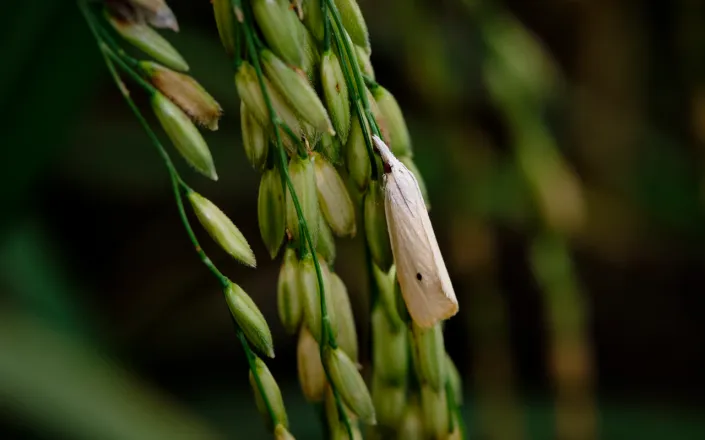
Syngenta Biologicals and Provivi® partner on new pheromone solutions, targeting devastating pests in key crops across Asia
- The new pheromone solutions will target Yellow Stem Borer and Fall Armyworm
- These aggressive pests have spread rapidly within Asia’s major rice and corn production regions
- The collaboration expands options for growers in India, Indonesia and Thailand to farm more sustainably
Basel, Switzerland and Santa Monica, Ca., US, 4 September 2024 – Syngenta Biologicals and Provivi today announced a collaboration to develop and commercialize new pheromone-based biological solutions to effectively and more safely control detrimental pests in corn and rice – crops that serve as a primary food source for 3.5 billion people globally.
The collaboration brings together Provivi’s expertise in pheromone-based crop protection solutions with Syngenta’s global reach and development capabilities. The two new pheromone solutions will help farmers manage the devastating pests, Yellow Stem Borer (YSB) in India and Indonesia and Fall Armyworm (FAW) in Thailand.
The YSB Eco-Dispenser for India and Indonesia, and the FAW Eco-Granules for Thailand will be available to farmers starting in 2026. These innovative product formulations, made from biodegradable materials, represent significant advancements such as enhanced efficacy, longer duration, and improved environmental sustainability for the benefit of farmers.
Pheromones are natural signaling compounds that effectively control pests by interfering with their mating behaviors, preventing pest reproduction. Because they are non-toxic and species-specific, pheromones do not harm organisms that pose zero threat, therefore helping preserve the diversity and abundance of beneficial insects and pollinators. The benefits of using pheromones in an integrated pest management program include their highly specific target activity and a mode of action, preventing, instead of eliminating, thereby supporting the preservation of biodiversity and the flourishing of non-target species.
The YSB and FAW pests stand out as among the most destructive insect pests in agriculture, threatening a wide variety of crops in many countries and impacting farmers’ livelihoods as well as food security. As the dominant pest of rice in Asia, YSB pests can attack rice crops throughout different phases of the plant’s life, resulting in crops with “dead hearts” and “white ears” – symptoms of dried-up central shoots and chaffy, or unfilled grain, leading to significantly lower yields.
The FAW – which is in fact a caterpillar and not a worm – is notable for its destructive capacity and rapid spread. Since the discovery of the FAW pest in Thailand in late 2018, farmers in the country have seen yields fall as much as 40 per cent for corn, and in some cases been forced to plough under entire fields. This has severe implications for corn production in Thailand, where the crop is vital for the country’s economy, supporting both domestic and export markets.
Syngenta and Provivi have previously collaborated to bring the pheromone-based technology NELVIUM® to Indonesia to control rice stem borer insects. The expansion of the pheromone partnership with Provivi is aligned with Syngenta’s sustainability priorities, which includes accelerating crop productivity while reducing the impact on the planet, through more sustainable technologies.
Jonathan Brown, Global Head of Biologicals and Seedcare at Syngenta: “Farmers need solutions that effectively address pest pressure while ensuring sustainability on their farms, particularly as pest threats evolve with climate change. We’re proud to work together with Provivi to deliver the next-generation in pheromone-based biocontrols that target farmer key pest challenges.”
Pedro Coelho, Chief Business Officer at Provivi®: “Pheromone-based solutions are non-toxic and species-specific, and safeguard biodiversity by preserving beneficial insects and pollinators. We are excited to work again with Syngenta to broaden the offer of pheromone-based solutions available to farmers in Asia.”
About Syngenta Crop Protection AG
Syngenta Crop Protection AG is a leader in agricultural innovation, bringing breakthrough technologies and solutions that enable farmers to grow productively and sustainably. We offer a leading portfolio of crop protection solutions for plant and soil health, as well as digital solutions that transform the decision-making capabilities of farmers. Our 18,300 employees serve to advance agriculture in more than 90 countries around the world. Syngenta Crop Protection AG is headquartered in Basel, Switzerland, and is part of the Syngenta Group. Follow us on X (@Syngenta, @SyngentaUS), and on LinkedIn.
Contact Information
media@syngentagroup.com
About Provivi®
Provivi® is a science-based company that develops scalable and safer insect control technologies targeting the most destructive pests in agriculture worldwide. The company's Nobel prize winning technologies enable a step change in the production of affordable pheromone-based solutions that can be conveniently used by growers for preventive pest control. Headquartered in Santa Monica, California, the company also has operations in Mexico, Brazil, Indonesia, and Europe. For more information, visit www.provivi.com and follow us on X (@Provivitm, @ProviviMx), and on LinkedIn.
Cautionary Statement Regarding Forward-Looking Statements
This document may contain forward-looking statements, which can be identified by terminology such as ‘expect’, ‘would’, ‘will’, ‘potential’, ‘plans’, ‘prospects’, ‘estimated’, ‘aiming’, ‘on track’ and similar expressions. Such statements may be subject to risks and uncertainties that could cause the actual results to differ materially from these statements. For Syngenta, such risks and uncertainties include risks relating to legal proceedings, regulatory approvals, new product development, increasing competition, customer credit risk, general economic and market conditions, compliance and remediation, intellectual property rights, implementation of organizational changes, impairment of intangible assets, consumer perceptions of genetically modified crops and organisms or crop protection chemicals, climatic variations, fluctuations in exchange rates and/or commodity prices, single source supply arrangements, political uncertainty, natural disasters, and breaches of data security or other disruptions of information technology. Syngenta assumes no obligation to update forward-looking statements to reflect actual results, changed assumptions or other factors.
©2024 Syngenta. Rosentalstrasse 67, 4058 Basel, Switzerland.


